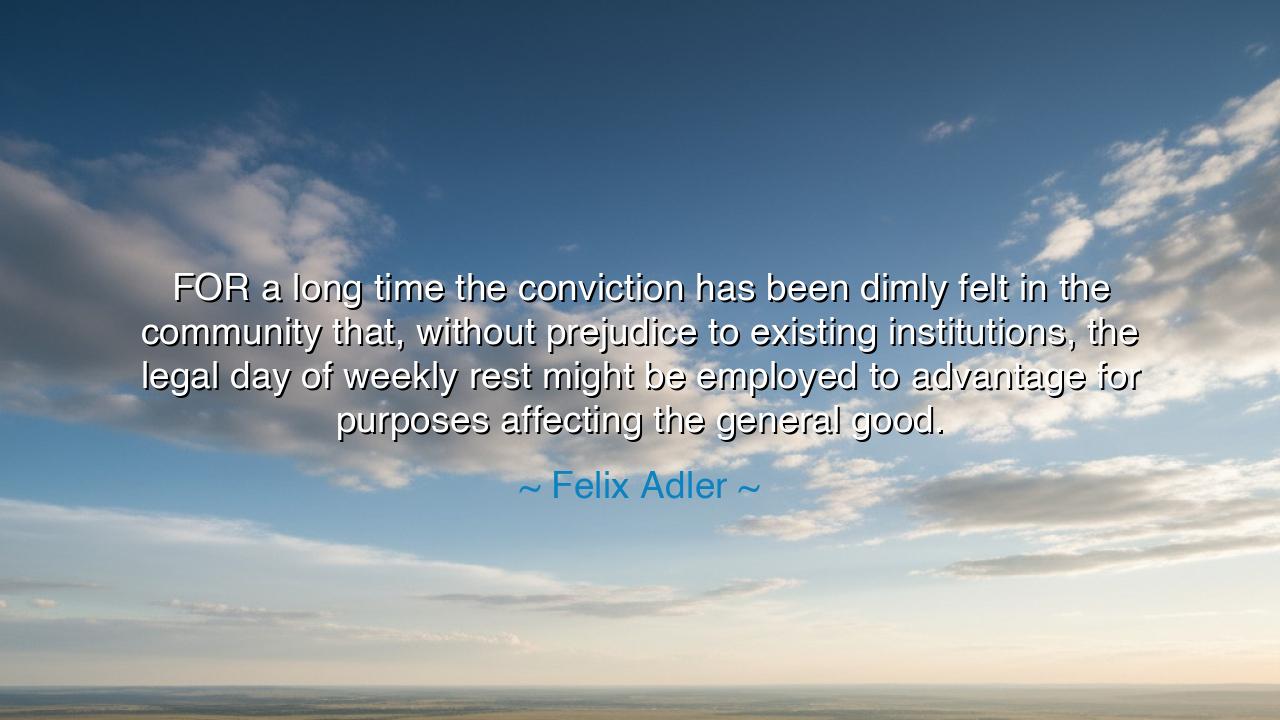
FOR a long time the conviction has been dimly felt in the
FOR a long time the conviction has been dimly felt in the community that, without prejudice to existing institutions, the legal day of weekly rest might be employed to advantage for purposes affecting the general good.






The words of Felix Adler shine with quiet yet enduring strength: “For a long time the conviction has been dimly felt in the community that, without prejudice to existing institutions, the legal day of weekly rest might be employed to advantage for purposes affecting the general good.” In this saying we hear not only the voice of a philosopher, but the echo of humanity’s ancient longing for rest, renewal, and a life lived not only for self but also for the common good. Adler, the founder of the Ethical Culture movement, sought to awaken society to its higher calling, urging that even the simple act of setting aside one day could be transformed into a force for justice, compassion, and collective flourishing.
The legal day of weekly rest, born in part from religious traditions of Sabbath and in part from social necessity, was originally conceived as a protection for the laborer’s body and spirit. Too many lives had been ground down by endless toil, too many souls crushed beneath the wheel of ceaseless industry. But Adler looked beyond the personal to the communal, declaring that such a day could serve not only the individual worker, but also the community as a whole. It could be a day not merely of idleness or withdrawal, but of service, reflection, and shared purpose.
In ancient times, the Sabbath was not simply a pause in labor—it was a declaration of dignity. The Israelites, fresh from the chains of Egypt, were commanded to rest, as a sign that they were no longer slaves to endless work but free children of a just God. This day of rest equalized the master and the servant, the rich and the poor, the native and the stranger. Adler, in his age, sought to reclaim this same principle, but without binding it to creed alone. For him, the weekly rest could be lifted into a universal practice of ethical renewal, open to all faiths and none, grounded in humanity’s shared need for balance and justice.
The idea carries deep resonance in our own era. Consider the tragedy of the Industrial Revolution, when factories devoured the time and health of men, women, and children. Only through struggle did workers wrest from the powerful the recognition of a work-free day, and later, the weekend. Yet Adler’s wisdom reminds us that such a gift should not be spent solely on pleasure or consumption. He envisioned a higher use: dedicating rest to purposes affecting the general good, such as education, community service, and the uplifting of society. Rest, rightly employed, could become a tool not of stagnation but of transformation.
History gives us noble examples of this principle. When Jane Addams founded Hull House in Chicago, she gathered volunteers who devoted their leisure time to teaching, healing, and assisting the poor. These were hours carved not from obligation but from willingness, from a sense that personal rest could be turned outward into communal blessing. Such actions embody Adler’s call: that a society is strongest not when its people merely recover from labor, but when they use their freedom to lift one another higher.
The lesson is clear: rest is not the opposite of action, but the foundation of righteous action. A life that is all work becomes hollow, but a life that is all leisure becomes aimless. The sacred balance lies in using periods of rest as opportunities for reflection, renewal, and generosity. When we pause from our striving, we are better able to see the needs of others, to hear the cries of the weary, and to act with compassion.
Therefore, let each of us reclaim a portion of our time—be it a day, an hour, or even a moment—and consecrate it to the general good. Use your rest not only to restore your own body, but to restore the brokenness around you. Teach, volunteer, plant, heal, or simply offer kindness. In doing so, you will turn rest into a sacred act, and the rhythm of life into a harmony of service.
So remember the wisdom of Felix Adler: the legal day of weekly rest is not a mere pause in the machinery of labor, but a chance to ennoble life itself. Use it well, and you will discover that rest, when offered to the community, becomes not idleness, but a seed of greatness sown into the soul of the world.






AAdministratorAdministrator
Welcome, honored guests. Please leave a comment, we will respond soon